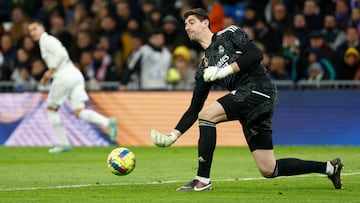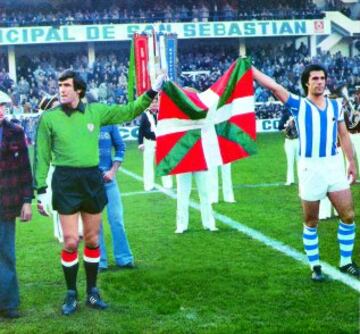LALIGA SANTANDER
Why are LaLiga Santander goalkeepers wearing black this weekend?
Shot stoppers across the country and world have been invited to wear black as a tribute to one of Spain’s greatest goalkeepers.

This weekend in Spain, a hugely special figure in football - and society in general - who celebrated his 80th birthday on March 1: José Ángel Iribar was the goalkeeper for Athletic Club de Bilbao for 18 seasons, and played a record 614 games for the Basque club.
To honour him, Athletic have invited all clubs across Spain and beyond, from professional level to grassroots, to wear black as a symbol of recognition for his services to football and Spanish history.

José Ángel Iribar’s story
Iribar, also known as ‘Txopo’, was born in Zarautz, in the Basque Country in northern Spain. He began to play for Athletic Club in 1962, 23 years into Francisco Franco’s fascist regime, in which regional languages such as Catalan and basque were banned, as were the flags - everything that was a potential symbol of something other than centralised Spain was not allowed. At this time, in 1962, he didn’t know it, but Iribar would become one of the figures and images of the legalisation of the Basque flag and an icon of change in the country.
Franco’s death came in 1975, and small steps started to be made away from a dictatorship and towards a democracy. In 1976, just months after the end of the regime that lasted over 30 years, with people not sure what was allowed and what was going to have them thrown in prison, an idea came to Real Sociedad player Josean de la Hoz. He idealised about one day flying the illegal Ikurriña, the Basque flag, and thought football was the way to make change happen: he would present the flag to the stadium before a game with Athletic Club de Bilbao.

Smuggling a flag in a car wheel
De la Hoz drove his blue FIAT 128 to Zarautz, where, incidentally, Iribar was born, and bought the green, red and white fabrics needed for the still illegal flag. He asked his sister - who had no idea about the plan he was cooking up - to sew them together and make him an Ikurriña.
Real Sociedad centre-back and captain, Inaxio Kortabarria had told Iribar of the plan just before the game, to which, after checking with his players, he agreed. They would fly the Ikurriña out on the pitch at Atotxa. The flag was now made and secretly transported to Real Sociedad’s Atotxa Stadium in the spare wheel compartment of De la Hoz’s car, before being stuffed inside a bag of water and sponges to get it past the police inside the ground.
As the two captains, Iribar and Kortabarria, stepped out onto the pitch, De La Hoz - who was a substitute - ran down from the stands and handed the two players the flag that was unfurled and held aloft inside the stadium that was erupting with joy. The police decided not to intervene, making it the first time the Ikurriña was flown since Franco’s death without police repercussions.
The famous photo that you can see below, with Iribar on the left, has become a moment etched into the history of Spain.

In 1977, months later, mayors in the Basque Country called for the formal legalisation of the Ikurriña and their request was granted just 3 days later. Iribar had said “if any of [the Athletic players] had said no, we woulnd’t have done it.” But they all said yes, and Iribar helped to make history. The flag still sits today in the club museum.
Iribar played over 600 games for Athletic Club and won the Spanish cup twice, coming runner-up three times. he also won the UEFA European Championship with Spain in 1964 - a trophy they did not win again until 2008 - and the Ricardo Zamora Trophy (Spain’s best goalkeeper) in the 1969-70 season.
If you, or someone you know, at whatever level of football it may be, knows someone who plays in goal, tell them to wear black this weekend for José Ángel Iribar.
The full statement from Athletic Club is as follows:
- Athletic Club has broadened its homage to Jose Angel Iribar, who turned 80 years old today, extending an invitation to all clubs in LaLiga Santander and LaLiga Smartbank to join the initiative by having their goalkeepers play in black this weekend.
- The club would also like to extend this invitation to football teams and goalkeepers all over the world, it would be an honour if any shotstopper in any league wished to pay homage to Iribar in their own way.
- As a tribute to ‘Txopo’, Athletic Club has already co-ordinated with clubs in Bizkaia so that their goalkeepers will wear black jerseys this weekend. The black strip was a trademark for the legendary shotstopper who made 614 official appearances for Athletic - a club record which still stands.
- Athletic Club has recieved permission from the Technical Committee of Referees and LaLiga so that both goalkeepers in the same fixture can wear the same colour during this specific matchday weekend.
If it is not feasible for some clubs, due to outfield players’ kits, for example, Athletic Club invites the goalkeeper to put on a black strip for the official photo of the starting XI, even if they are then obliged to play in another colour.
A significant number of professional goalkeepers from all over the world have already expressed their intention to take part in the initiative.







